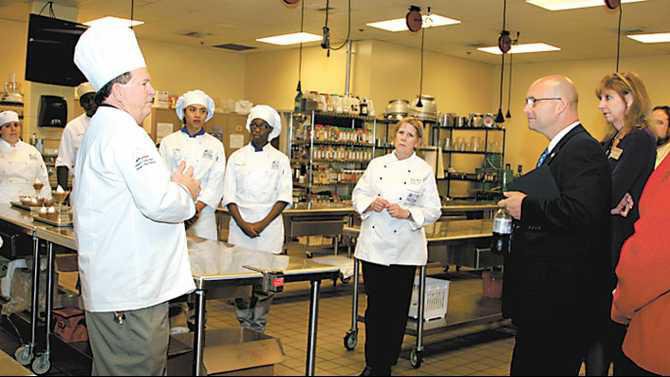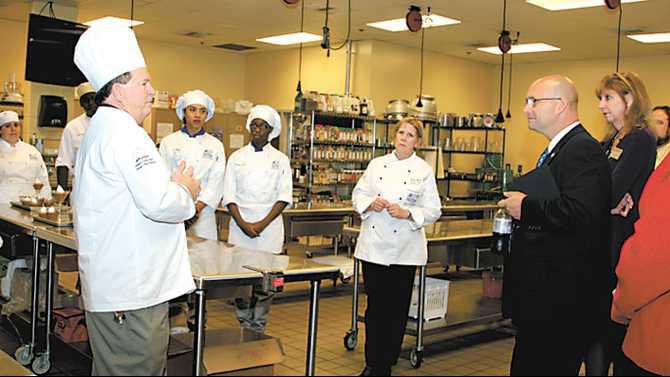More students would be doing many of the things that Rockdale County Public Schools students are already doing if the State Superintendent had his way.
State Superintendent Dr. John Barge visited Rockdale last week, touring the Rockdale Career Academy and speaking to the Rockdale Rotary Club about some of the proposed changes coming down the pike for Georgia’s public education system.
During the talk, Barge expressed dissatisfaction with the way the current system funneled all children towards college.
“There’s very little room for us to treat children as individuals. The idea of mass production of graduates is not working well,” he said.
One change in the immediate future is the calculation of Georgia’s graduation rate. All states will be required to switch to the cohort calculation method, which counts how many students complete high school in four consecutive years. Currently, Georgia uses the leaver rate method, which includes students who make up credits or complete school in more than four years.
“I’m warning folks up front,” said Barge. “When the graduation rates come out, it’s going to be at least a 10 percent reduction, possibly more.”
When looking at historical data adjusted for the different calculation method, the state is making strides in graduating students, said Barge.
However, out of the students that do drop out, many do so because they don’t see a connection between school and life, Barge said.
“They see high school as unrelentingly boring and not relevant to what they want to do,” said Barge. “They don’t see a connection between school and a career.”
To address this, a state bill signed into law last year will require high school students to have a career pathway starting in ninth grade, to help determine what tests students will need to take and what classes would be beneficial.
The proposed change that’s taken up the most headlines has been a waiver application to the federal No Child Left Behind system. Georgia is one of about a dozen states applying for the waiver.
Instead of an assessment based on a single test, the state proposed a College and Career Readiness Index – an assessment based on a wide variety of factors rather than a single test.
“With No Child Left Behind, what we’ve done is prepared children to pass a test,” said Barge. “We’re graduating a lot of kids that can pass a test but are they ready to pass a test and ready for careers?”
The CCRI would take into account academic achievement, academic progress, and closing of the achievement gap. In addition to the CCRI, schools would also be given an “efficiency rating” to show how much money is being spent per student versus the results being achieved.
NCLB has increasing absolute benchmarks each year, and will require 100 percent graduation by 2014. “I told (U.S. Department of Education) Secretary Duncan that will never happen,” said Barge. He pointed out the federal government does not recognize special education diplomas, even for the profoundly developmentally disabled.
If the state is granted the NCLB waiver, schools and school systems would be put on hold for 2011-2012 so benchmark data can be collected.
“ It’s not a wiping the slate clean, they’re going to stay put,” explained Barge. Under the proposed system, Needs Improvement schools would receive support specifically tailored to their needs.
Ga. DOE spokesperson Matt Cardoza said Secretary Duncan was impressed with the stakeholder involvement in creating the CCRI.
“We’re one of the first ones to submit a waiver with the next generation accountability system. Many have come with waivers to parts of the law, just trying to get out from under it. Instead of this is a better accountability measure,” Cardoza said.
RCPS school board member Darlene Hotchkiss said, “Georgia didn’t come and say we don’t like it. Georgia came with a clear picture of what direction to go.”
As for the wide variety of measurements and factors, RCPS Assistant Superintendent Gene Baker said RCPS already tracks and reports to the school board on much of the information that would be required in the CCRI.




